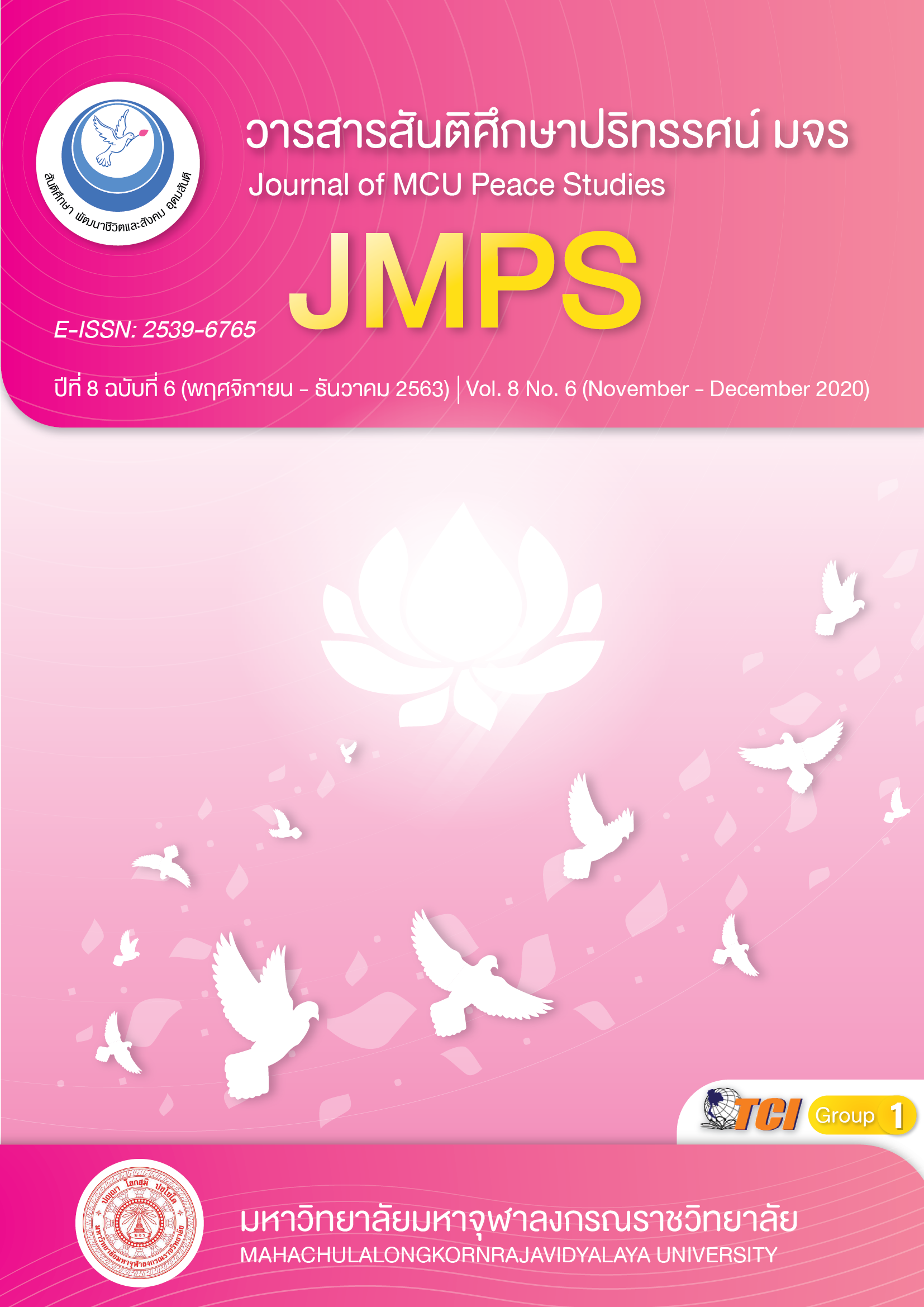การประเมินหลักสูตรบริหารธุรกิจบัณฑิต (นานาชาติ) ของสถาบันอุดมศึกษาเอกชน
Main Article Content
บทคัดย่อ
บทความวิจัยนี้ มีจุดมุ่งหมายเพื่อประเมินหลักสูตรบริหารธุรกิจบัณฑิต (นานาชาติ) ของสถาบันอุดมศึกษาเอกชน โดยใช้การประเมินหลักสูตรแบบซิปป์ (CIPPIEST Model) ประกอบด้วย 8 ด้าน คือ ด้านบริบท ด้านปัจจัยนำเข้า ด้านกระบวนการผลิต ด้านผลผลิต ด้านผลกระทบ ด้านประสิทธิผล ด้านความยั่งยืน และด้านการถ่ายโยงความรู้ กลุ่มตัวอย่างของงานวิจัยนี้มีจำนวนทั้งสิ้น 569 คน ประกอบด้วย ผู้บริหาร อาจารย์ และบุคลากร จำนวน100 คน นักศึกษาจีน จำนวน 269 คน ศิษย์เก่าจีน จำนวน 100 คน และผู้ใช้บัณฑิตจีน จำนวน 100 คน เครื่องมือที่ใช้ในการประเมิน คือ แบบสอบถาม สถิติที่ใช้ในการวิเคราะห์ข้อมูลทางสถิติ ได้แก่ ค่าความถี่ ค่าร้อยละ ค่าคะแนนเฉลี่ย ค่าความเบี่ยงเบนมาตรฐาน และการวิเคราะห์เนื้อหา (Content Analysis) โดยมีค่าความเชื่อมั่นของแบบสอบถามทั้งฉบับเท่ากับ 0.97 ผลการวิจัยพบว่า 1) ด้านบริบท มีความเห็นโดยรวมว่ามีความเหมาะสมในระดับมาก 2) ด้านปัจจัยนำเข้า มีความเห็นโดยรวมว่ามีความเหมาะสมในระดับมาก 3) ด้านกระบวนการผลิต มีความเห็นโดยรวมว่ามีความเหมาะสมในระดับมาก 4) ด้านผลผลิต มีความเห็นโดยรวมว่ามีความเหมาะสมในระดับมาก 5) ด้านผลกระทบ มีความเห็นโดยรวมว่ามีความเหมาะสมในระดับมาก 6) ด้านประสิทธิผล มีความเห็นโดยรวมว่ามีความเหมาะสมในระดับมาก 7) ด้านความยั่งยืน มีความเห็นโดยรวมว่ามีความเหมาะสมในระดับมาก และ8) ด้านการถ่ายโยงความรู้ มีความเห็นโดยรวมว่ามีความเหมาะสมในระดับมาก จึงกล่าวได้ว่าในการประเมินหลักสูตรนานาชาติระดับปริญญาตรีครั้งนี้ ผู้บริหาร อาจารย์ และบุคลากร นักศึกษาจีน ศิษย์เก่าจีน และผู้ใช้บัณฑิตจีน มีความเห็นสอดคล้องตรงกันว่าหลักสูตรนานาชาติระดับปริญญาตรีมีความเหมาะสมในระดับมาก
Article Details
ทัศนะและความคิดเห็นที่ปรากฏในบทความในวารสาร ถือเป็นความรับผิดชอบของผู้เขียนบทความนั้น และไม่ถือเป็นทัศนะและความรับผิดชอบของกองบรรณาธิการ ยินยอมว่าบทความเป็นลิขสิทธิ์ของวารสาร
เอกสารอ้างอิง
Boonsukkaew, J. (2018). The network office International study of Thai, Chinese. Interview. October, 5.
Chareonwongsak, K. (2008). Language skills, an important factor in studying abroad. Retrieved November 8, 2017, from http://www.kriengsak.com/node/1404.
Chinpanyakun, T. et al. (2017). Assessment of the new curriculum: CIPPIEST format. Journal of the Police, 9(2), 211.
Cronbach, L. J. (1984). Essential of Psychology and Education. New York: Mc-Graw Hill.
Ferguson, G. A. (1981). Statistical Analysis in Psychology and Education. (5th ed.). New Yok: McGraw – Hill.
Hirunsuk, N., & Pincharoen, S. (2013). Graduate opinions about participation issues. And do not participate in student activities, affecting work behavior after graduation. Business Journal Review, 5(1), 112.
Khon Kaen University. (2016). University ranking criteria. Retrieved November 23, 2017, from https://plan.kku.ac.th/pln2013/files/Ranking2016.pdf
King Mongkut's Institute of Technology North Bangkok. (2009). The organization of happiness. Journal of Insurance News The quality of King Mongkut's Institute of Technology North Bangkok, 198, 28-39.
Kupongsak, N. (2012). Problems of using Thai language of international students: a case study of Chinese students at Bangkok University. Retrieved November 17, 2017, from https://www.tcithaijo.org/index.php/huru/article/view/25645.
Lertgrai, P. et al. (2019). Innovation management for organizational development. Journal of MCU Nakhondhat, 6(8), 3755.
Likert, R.A. (1932). Technique for the Measurement of Attitudes. Arch Psychological, 25(140), 1–55.
Oliva P.F. (2009). Developing the Curriculum. (3rd ed.). New York : Harper Collins.
Ornstein, A.C., & Hunkins, F.P. (1993). Curriculum: Foundation, Principles and Issue. Boston: Allyn and Bacon.
Permgrasorn, N. (2008). Problems of Thai language usage of Chinese students studying Thai as a foreign language. Retrieved February 2, 2018, from http://digi.library.tu.ac.th/index/0027/8-Nov-2551/06PAGE146-PAGE159.pdf
Pongkhaphat, T. (2004). State University. Vision for reform. Matichon Daily, 12(9560), 6.
Ritcharoon, P. (2015). Course evaluation: Concepts Process and use of evaluation results. Thammasat Education. Journal, 8(1), 27.
Stufflebeam, D. L., & Coryn, C. L. S. (2014). Evaluation: Theory, models and applications.
(2nd ed.). San Francisco: Jossey-Bass.
_______. (2007). Evaluation: Theory, models and applications. San Francisco: Jossey-Bass.
Suddan, W., Chomhongphiphat, P., & MamKhokSung, P. (2013). Strategies to Promote Participation in Curriculum Support Activities of Students. Kasetsart University Chaloem Phrakiat Campus Sakon Nakhon province. Journal of Nakhon Phanom University, 3(3), 27-32.
Sukanin, J. (2018). Saisampan School. Interview. September, 12.
Sutika, M. et al. (2019). Outcomes of the industrial education curriculum: a study through the perspective of graduates. Education Chiang Mai University, 3(1), 21.
Wongyai, W. (2011). Curriculum development in higher education. (2nd ed.). Bangkok:
R and Print Company Limited.
Xia, H. (2018). Thai-Chinese Personnel Exchange. Interview. August, 20.


